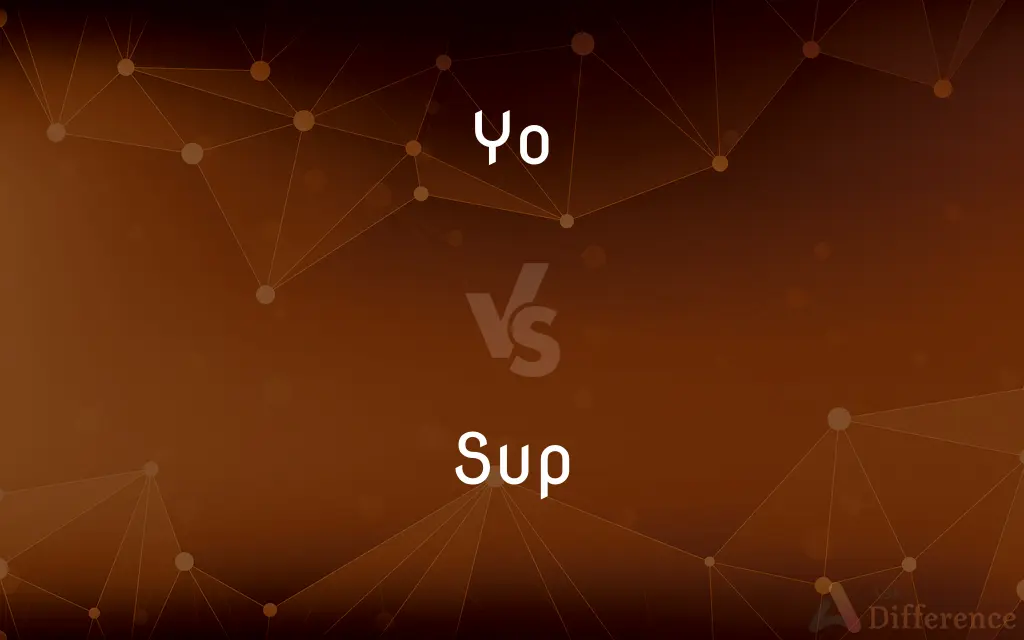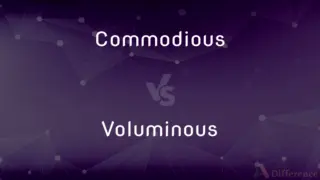Yo vs. Sup — What's the Difference?
By Tayyaba Rehman & Urooj Arif — Updated on April 17, 2024
"Yo" is a casual greeting often expressing familiarity or attention, while "Sup" is a colloquial form of "What's up?" used to inquire casually about one's state or activities.

Difference Between Yo and Sup
Table of Contents
ADVERTISEMENT
Key Differences
Yo is primarily used to grab someone's attention or as a straightforward greeting, reflecting a direct and engaging approach. Whereas, Sup, short for "what's up", serves as both a greeting and a light inquiry into someone's current situation or feelings.
Yo can be seen as more versatile in its usage, applicable as a call to attention in various contexts, from friendly to confrontational. On the other hand, Sup is almost exclusively casual and laid-back, implying a level of familiarity and informality.
Yo has historical roots in African American Vernacular English (AAVE), where it has cultural significance and depth beyond a mere greeting. Meanwhile, Sup evolved as a shorthand slang within informal American English, often used among younger demographics.
Yo is used globally in diverse cultures, popularized through music, particularly hip-hop, which often carries an assertive tone. Conversely, Sup is typically used in more casual, everyday conversations, carrying a relaxed and unassuming air.
Yo might be employed to initiate a conversation or interaction, sometimes standing alone as a complete expression. In contrast, Sup generally expects a response related to the person's activities or feelings, initiating a dialogue.
ADVERTISEMENT
Comparison Chart
Definition
Casual greeting or call to attention
Colloquial inquiry "What's up?"
Usage Context
Versatile, from friendly to assertive
Informal, relaxed conversation
Linguistic Origin
African American Vernacular English
Informal American English
Cultural Significance
Strong, especially in music and urban communities
Limited, primarily among youth
Expected Response
Can stand alone or start a conversation
Generally expects an informative response
Compare with Definitions
Yo
Used to express recognition or surprise.
Yo, that was an amazing play!
Sup
Used among friends to maintain connection.
Just texting to say sup.
Yo
Greeting or call to attention.
Yo, can you help me with this?
Sup
Informal greeting inquiring about one’s state.
Sup, how's everything going?
Yo
Casual way to address someone.
Yo, John, over here!
Sup
Often implies expectation of a casual update.
Sup, any plans for the weekend?
Yo
Expresses familiarity and camaraderie.
Yo, long time no see!
Sup
Casual conversation starter.
Sup, what are you up to today?
Yo
Can signify the start of a statement.
Yo, listen up everyone.
Sup
Indicates a laid-back approach to communication.
Sup, anything new with you?
Yo
Yo is a slang interjection, commonly associated with North American English. It was popularized by the Italian-American community in Philadelphia, Pennsylvania, in the 1940s.Although often used as a greeting and often deployed at the beginning of a sentence, yo may also come at the end of a sentence and may be used for emphasis or to direct focus onto a particular individual or group or to gain the attention of another individual or group.
Sup
To eat or drink (something) or engage in eating or drinking by taking small swallows or mouthfuls
Supped the hot soup.
Supped away daintily.
Yo
Used as a greeting or to attract someone's attention.
Sup
To eat an evening meal; have supper.
Yo
Used to express emphasis
Today's my birthday, yo.
Sup
A small swallow or mouthful of liquid food; a sip.
Yo
(slang) A greeting similar to hi.
Yo Paulie! How's it going?
Sup
Used as an informal greeting.
Yo
(slang) An interjection similar to hey.
Yo, check this out!
Check this out, yo!
Sup
To sip; to take a small amount of food or drink into the mouth, especially with a spoon.
Yo
(slang) An expression of surprise or excitement.
Yo, that's crazy, but I don't remember asking.
Sup
To take supper.
Yo
(military slang) Present! Here!
Sergeant: Smith?
Private Smith: Yo!
Private Smith: Yo!
Sup
A sip; a small amount of food or drink.
Yo
Emphatic conclusion to a statement.
Sup
(informal) Superintendent.
Yo
(colloquial) your
Yo sandwich has only bacon in it. Want some ketchup on that?
Sup
(mathematics) Supremum, upper limit.
Yo
(Baltimore) third-person singular, familiar
Yo was tuckin' in his shirt! ([http://americanspeech.dukejournals.org/cgi/content/abstract/82/3/262 Stotko and Troyer 2007])
Sup
Supplement.
Yo
The letter Ё, ё.
Sup
(Cambridge University slang) A supervision.
Yo
Obsolete form of yue, a traditional Chinese unit of volume.
Sup
(slang) what's up (either as a greeting or actual question)
— Sup?
— Not much.
— Not much.
Sup
(physics) Being or relating to the squark that is the superpartner of an up quark.
Sup
To take into the mouth with the lips, as a liquid; to take or drink by a little at a time; to sip.
There I'll supBalm and nectar in my cup.
Sup
To eat the evening meal; to take supper.
I do entreat that we may sup together.
Sup
To treat with supper.
Sup them well and look unto them all.
Sup
A small mouthful, as of liquor or broth; a little taken with the lips; a sip.
Tom Thumb had got a little sup.
Sup
A small amount of liquid food;
A sup of ale
Sup
Take solid or liquid food into the mouth a little at a time either by drinking or by eating with a spoon
Common Curiosities
What does "sup" mean?
It's a colloquial way of asking "what's up?"
Can "yo" be considered polite?
It depends on context; it can be seen as casual and friendly.
What does "yo" mean?
It's a casual greeting or a way to grab attention.
How is "yo" typically used?
As a greeting, call to attention, or to express recognition.
What is the origin of "yo"?
It has roots in African American Vernacular English.
How has "yo" been popularized in culture?
Through its extensive use in hip-hop and urban music.
Can "yo" be used internationally?
Yes, it's recognized globally, especially in places influenced by American culture.
How do you respond to "sup"?
Typically with a brief update on your state or activities.
What type of response does "sup" expect?
A casual update or acknowledgment of the greeting.
Is "sup" appropriate in formal settings?
No, it is best suited for casual, informal interactions.
How should one use "sup" effectively?
Use it to initiate light, friendly conversations with peers.
Does "sup" carry any cultural significance?
It reflects modern, informal youth language in America.
Is "yo" offensive?
Not inherently, but its appropriateness depends on the social context and relationship between individuals.
What scenarios are best for using "yo"?
Among friends, in casual settings, or to quickly get someone's attention.
Can "sup" be used to start a deeper conversation?
It typically starts more superficial chats but can lead to deeper interactions based on the response.
Share Your Discovery

Previous Comparison
Commodious vs. Voluminous
Next Comparison
Clay vs. BentoniteAuthor Spotlight
Written by
Tayyaba RehmanTayyaba Rehman is a distinguished writer, currently serving as a primary contributor to askdifference.com. As a researcher in semantics and etymology, Tayyaba's passion for the complexity of languages and their distinctions has found a perfect home on the platform. Tayyaba delves into the intricacies of language, distinguishing between commonly confused words and phrases, thereby providing clarity for readers worldwide.
Co-written by
Urooj ArifUrooj is a skilled content writer at Ask Difference, known for her exceptional ability to simplify complex topics into engaging and informative content. With a passion for research and a flair for clear, concise writing, she consistently delivers articles that resonate with our diverse audience.













































